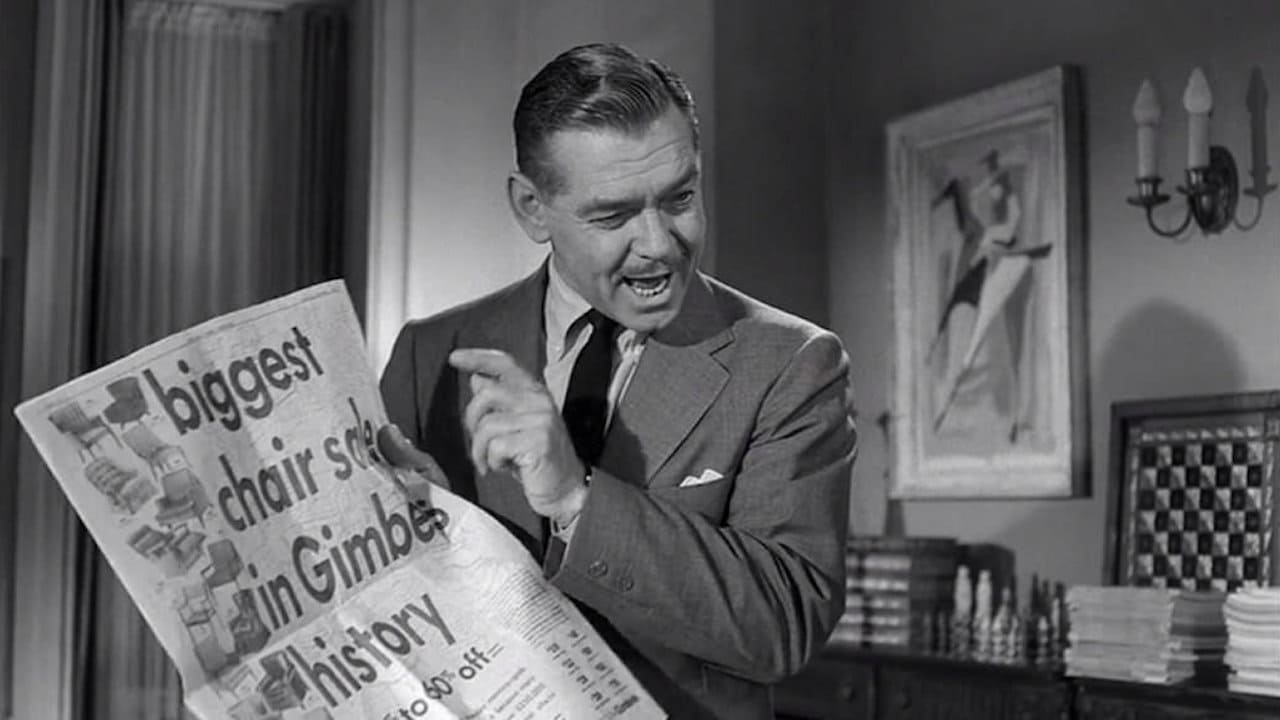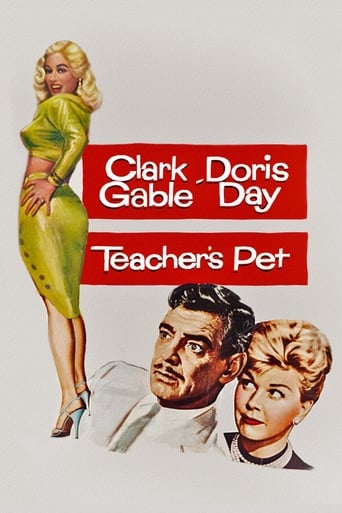

Wonderful character development!
... View MoreThis movie was so-so. It had it's moments, but wasn't the greatest.
... View MoreIt isn't all that great, actually. Really cheesy and very predicable of how certain scenes are gonna turn play out. However, I guess that's the charm of it all, because I would consider this one of my guilty pleasures.
... View MoreThere are moments in this movie where the great movie it could've been peek out... They're fleeting, here, but they're worth savoring, and they happen often enough to make it worth your while.
... View MoreBefore "Teacher's Pet," most movies showed the press in unflattering ways. Not that it wasn't accurate, or deserving. The sensationalist press of the early 20th century seemed to relish its often exaggerated reporting of events. Indeed, it thrived on such fodder. But, this movie for the first time takes a serious look at the newspaper field. It does that with a comedy romance that stars Clark Gable and Doris Day. He was 57. She was 36. Both were big stars and major box office draws. They had never been matched together in a movie before. But they had a chemistry that works perfectly for this story. This isn't a comedy filled with antics and running dialog of humorous lines. Rather, it's a sophisticated comedy with satire that is built around the newspaper trade – or profession, depending on one's point of view. Watch this film and you'll get the drift about the differences in those two descriptions. Gable is James Gannon, a hard-bitten city news editor of a major New York City paper. He came up the hard way and learned the newspaper trade by experience. He was a first-rate reporter who knew how to write. He knew how to edit and lay out a paper. And he knew the business. Day is Erica Stone, a college instructor in journalism. She grew up in the business with her father who had run a weekly newspaper and won a Pulitzer Prize. She had some experience and she knew the business, including how to teach journalism. Both have prejudices, but Gannon's is the strongest and weakest. He looks down on the college-trained employee the paper has hired and he relegates him to handling obituaries. He doesn't think people can learn to write or to be reporters in a classroom. Stone sees the street-wise, informally trained writer as a thing of the past. The beauty of this story is how they each influence the other's opinions, and how they get one another to see other possibilities. Of course, this is done over time and frequent contact that blooms into romance. It has good humor spread throughout the lessons of journalism and reporting. Along with this, there is a mild love triangle that becomes the source of much of the humor. Gig Young plays Dr. Hugo Pine who is collaborating with Erica on a book. They are also dating, and that rankles Gannon just enough to get him to try to show up Pine. But, unfortunately, Pine's knowledge and abilities prove too much for him – until they resolve it with a drinking match. Pine and Gannon become friends over time. When Gannon has second thoughts about his abilities, due to lack of formal education, Pine reassures him that he hasn't suddenly become inept. Pine, "You're confusing education with schooling. Education is the acquisition of knowledge. Knowledge is knowing, familiarity gained by experiences. Wisdom is defined as 'the possession of experience and knowledge.' Now, being experienced, you therefore have education, you have knowledge and you have wisdom."While the conclusions in the lines of an actor in a movie might surely be challenged by many, Pine's philosophical speech says a lot. I have known highly educated people (some as friends) and people who didn't finish high school (some as friends). A few of the former were not the brightest or wisest people I have known, while some of the latter are among the wisest. In Gannon's case, he was well read and he studied and learned his profession (or trade) well. But, he didn't have a diploma that said he acquired his knowledge through formal education.Grade school through high school teachers generally must have formal degrees. Most young people wouldn't be able to teach just based on experience. And, formal education usually includes some psychology and training in people skills and in being able to identify learning problems. But, by the college level of teaching, many fields don't require formal degrees. People with many years of experience and self- learning can be far more expert and knowledgeable than someone who has just graduated from college right out of high school. Such people might be found in writing, languages, philosophy, inventions, and some of the physical sciences. Others describe some of the plot, but I think most viewers will enjoy the film more by not knowing too many of the details beforehand. This is an interesting and informative film, as well as a satire and very good comedy romance. The performances are superb by all, including the several editors, reporters and others in the city room of Gannon's paper. I worked many years as a writer, including several on newspapers. This movie is a good picture of journalism and the press of the mid-20th century.Edna Kovac (Vivian Nathan) says to Gannon, "I don't care what anybody says, I like you!" And he didn't even flinch. Well, I don't care what others say, I like this film.
... View MoreThis movie was so good they remade it the very next year as Pillow Talk with the same femme lead Doris Day and the exact same plot - the Doris Day character, unseen, is a thorn in the side of the leading man who imagines a dry, unattractive spinster, and proceeds to unleash a vitriolic written/verbal attack on her. When, shortly afterwards, he sees her in the flesh, he decides to pursue her amorously under an assumed name; when he falls for her genuinely and decides to confess his deception he is thwarted by her own discovery of the truth. Naturally it all comes right in the end. In both movies there were three main roles, Day herself, a leading man, respectively Clark Gable and Rock Hundson, plus a third man, close to one or the other leads and well- supplied with both charm and humor; what Gig Young did for Teacher's Pet, Tony Randall did for Pillow Talk. Coming at the tail-end of the fifties, the last full decade of an ample supply of decent Hollywood movies able to take advantage of the highly efficient 'studio system' already unravelling, Teacher's Pet is a reminder of classic - 30s/40s - Hollywood and well up to snuff.
... View MoreClark Gable was the man! He easily pulls off this romantic comedy that is about more than romance, and actually has very important things to say about life. While co-star Doris Day was the future and Gable was running out the string as an actor, he still dominates this film and demonstrates his awesome chops as an actor, not just as a pretty face.Gable plays a hard-bitten newspaper editor, James Gannon, who learned the business by doing it, without any formal education. He is old school, and while defensive, still proud and confident of his abilities. Day is a professor who thinks that Gannon especially and the rest of his kind are badly in need of an education, and she lets the newspaper know her feelings.So, Gable goes down to Day's journalism class at his editor's command, takes a sudden shine to her, and enrolls without revealing his identity. The rest of the film revolves around Gannon's pursuit of Day, who is involved with an accomplished psychology teacher played by Gig Young, and their attempts to teach each other some lessons. There are many humorous incidents along the way, most flowing from Gannon's manly competition with Young - who doesn't fight back at all, and in fact winds up helping him - for Day's favors. If Gable has the Rock Hudson role, Young plays the Tony Randall sidekick. Mamie van Doren has a stunning supporting role, little more than a cameo, as Gannon's singer girlfriend whom Day memorably mimics outrageously later at her apartment.But the competition between the Gable and Young characters is just a sideshow. That wouldn't be a fair fight in any event, Gable's virility even at his advanced age is undeniable. The real fight is between Day's and Gable's ideas about journalism. Gable constantly surprises Day with the quality of his work, and Gable starts questioning everything he does because many of her ideas make a lot of sense. Can you teach an old dog new tricks? Apparently so. And have some fun along the way, too.An enjoyable romp that is made infinitely better because of the very serious message underlying the film. Question everything, and learn from that process! Nothing wrong with that. And Gable and Day make an amazingly cute couple, Day actually managing to look sexy now and then and not just perky as usual.
... View MoreThis has the look and feel of a 1938 film. The anachronistic acting style is embarrassing. Since we know from The Misfits that Gable was a smart actor, the dialogs itself is witty, the fault must lie in the heavy-handed direction. It is surprising that George Seaton started in the mid 1940's. Look at Gable's gestures in the early scene in the class room. Awful. Doris Day, on the other hand, gave a very respectable performance. The relevance of the thematic conflict between the uneducated tradesman vs the educated professional lapsed in relevance in the post war GI bill era. In 1938 this movie would have been hip. By 1958 it is unintentionally funny.
... View More